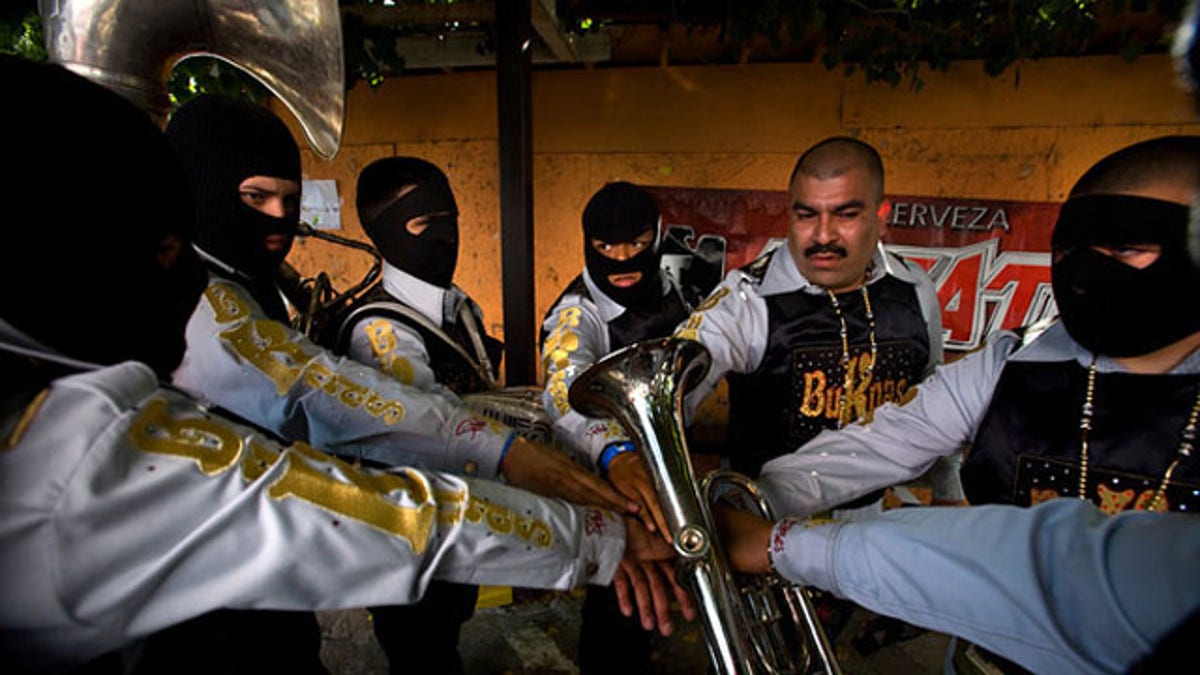
If you’ve heard the song ‘La Cucaracha’ you’ve heard a corrido before. Corridos are traditional Mexican folk ballads often played by ‘banda’ groups outfitted with tubas, trumpets, accordions and guitars.
These days, a new blend of this type of music is being popularized by many norteño groups who sing about and glamorize drug traffickers in Mexico’s bloody drug war. This new genre – known as the ‘Movimiento Alterado’ (or Altered Movement) – produces songs called narcocorridos.
Photojournalist Shaul Schwarz gives audiences a look into this growing culture—one that sees drug lords as ‘Robin Hood figures’— with the premier of his documentary, ‘Narco Cultura,’ (Narco Culture). The film shows how the drug war fuels narco culture on both sides of the border, following the stories of both a Mexican crime scene investigator in Ciudad Juarez and a Mexican-American narcocorrido singer.
“I wanted to make the film feel almost like a fiction that would really be a story of two people but then be a story of the issue,” said Schwarz told Fox News Latino. “So many people speak about Juarez and about the drug war but I want make them feel how it feels to be there.”
Mexico has seen 60,000 murders since President Felipe Calderón called for the war against drugs in 2006. The high number has given narcocorrido singers a lot to croon about, he said.
“Not doing anything is going to make the youth think that these are Robin Hoods,” Schwarz said. “Eventually that’s a cancer for Mexico.”
Many narcocorridos are commissioned by drug cartel leaders who give singers big payouts for creating and popularizing the musical tributes. But the singers are not the only people making big money off of the music. Narcocorrido singers play sell-out shows at venues both in Mexico and in some of the biggest cities in the United States.
José Fernández, who runs Tequila Productions, an entertainment company, says he brings ‘Movimiento Alterado’ bands because they’re what people want to hear. And, he said, the money audiences are willing to pay to hear narcocorridos is hard to pass up.
“I’ve had customers that have bought a whole VIP section of eight for $3,000,” Fernández said. “It’s not much. You know, we’re not talking about AC/DC and all of that, but for a Latino, that’s a lot.”
In most of Mexico, the government has prohibited radio stations from playing this type of music, which they say supports drug trafficking. But fans of the narco culture can download the music over the Internet, see graphic narco films, and even find original footage of killings. In part of Schwarz’s film, young school children speak out about how they want to grow up and have narco boyfriends or be famous narcos.
“Everybody is singing and glorifying this—it makes it that much easier for the kids to just jump in. And they know it, the cartels, and they like it,” said Schwarz. “And I think the pop culture of it and it being ‘la moda’ [in style], if you will, helps cartels take a lot of kids into their recruit basically.”
Although the influence narco culture has on young people in Mexico is strong, Schwarz says, narco culture followers in the U.S. see the music a bit differently.
“You see all this potential wealth and it’s a much stronger pull than if you’re in L.A. and you’re frustrated and McDonald’s is a bad job, but you still have more opportunity to get out of it,” said Schwarz.
Fernández says he sees ‘Movimiento Alterado’ as a way for audiences to feel like a rich and glamorous narco – even though fans are not directly involved in the violence.
“Ninety-nine percent of the guys that go to these events, they’re actually landscapers. They’re cooks. They’re doing something good for the nation, but it might just send the wrong image about the music, about the Latinos themselves,” he said.
Schwarz is one of the first photojournalists to thoroughly document the violence in Ciudad Juarez and has taken photos for many organizations including National Geographic, TIME Magazine, and the New York Times Magazine. He is currently a photographer for Getty Images.
Follow us on twitter.com/foxnewslatino
Like us at facebook.com/foxnewslatino













































